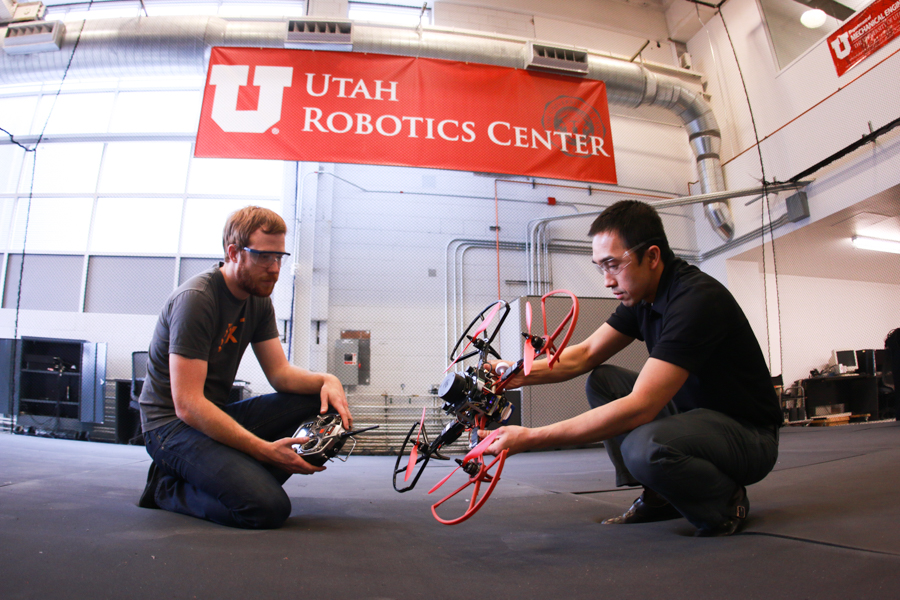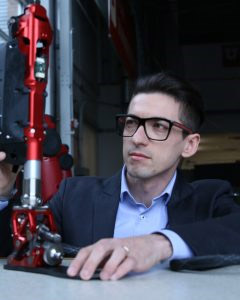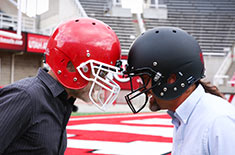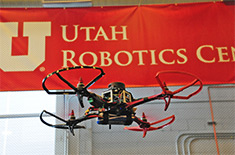Department of Mechanical Engineering Assistant Professor Tommaso Lenzi has been awarded a National Science Foundation Faculty Early Career Development Program (CAREER) award. The CAREER program is one of the NSF’s most prestigious award programs, offering 5 years of support to early-career faculty with the potential to serve as academic role models in research and education. The research grant, entitled “Bio-inspired Multi-joint Design and Control for Efficient and Lightweight Wearable Robots” will provide new knowledge related to wearable robotics by using bio-inspired actuation systems that concurrently assist multiple joints, much like human muscles. Existing exoskeletons are heavy and inefficient, which...
Read MoreProf. Leang receives new U.S. Airforce Phase I STTR project for autonomous aerial-robot chemical sensing
Kam Leang and industry partner Nevada NanoTech System recently received a U.S. Airforce Phase I STTR project for autonomous aerial-robot chemical sensing. The project will leverage the expertise of both teams to create intelligent agents for applications that include emergency response....
Read MoreProf. Mascaro receives $348K NIH grant to simulate tendon reconstructive surgeries
“Simulating Tendon Reconstructive Surgeries using a Virtual Hand Model and Robotic Testbed,” National Institute of Arthritis and Musculoskeletal and Skin Diseases (NIH R21). PI: Stephen Mascaro, Co-PI: Kenneth Foreman, 07/02/2019-05/31/2021, $347,798. The goal of this project is to advance tendon reconstructive surgery by providing a new way to predict the surgical outcomes using a virtual model for surgeons to examine the outcomes of surgery like range of motion and strength of grip. We currently have a unique virtual model of the tendon system of the human finger that can simulate the kinematics of the tendons and predict the pose...
Read MoreProf. Lenzi receives new $600K NSF NRI grant for control of robotic leg prostheses
For amputees, walking down the sidewalk verses taking the stairs can be considerable obstacles. Mechanical engineering assistant professor Tommaso Lenzi just received collaborative funding with Drs. Nicholas Fey and Kenneth Hoyt (University of Texas at Dallas), from the National Science Foundation Civil, Mechanical and Manufacturing Innovation (NSF CMMI), National Robotics Initiative (NRI), for their research entitled, “Muscle Ultrasound Sensing for Intuitive Control of Robotic Leg Prostheses,” $600,987 (U), and $578,233 (UT). The goal of this project is to fill the knowledge gap regarding the integration of the user’s volition or intuitive will, in the control of lightweight robotic ankle...
Read MoreAbbott, Kong, Leang and Monson receive $2M NSF EFRI Award
Congratulations to Profs. Abbott, Kong, Leang and Monson on their new $2M NSF EFRI Award, project in collaboration with R. Rajamani of Univ. of Minnesota and O. Pak of Santa Clara Univ. Project tile: “EFRI C3 SoRo: Magneto-electroactive Soft, Continuum, Compliant, Configurable (MESo-C3) Robots for Medical Applications Across Scales” The vision of this collaborative project between the University of Utah, the University of Minnesota, and Santa Clara University is to extend the capabilities of clinicians by enabling minimally invasive access to locations in the human body that are currently difficult or impossible to reach, using a new class of...
Read MoreProf. Lenzi receives $972K DoD CDMRP grant for motorized hip orthoses
Congratulations to Prof. Tommaso Lenzi for receiving new $972K DoD CDMRP grant entitled, “Motorized Hip Orthoses to Improve the Gait Ability of Transfemoral Amputees”. The goal of the project is to validate a new approach to improving amputees’ mobility—providing bilateral hip assistance with a motorized orthosis. Hip orthoses are very lightweight, and their mass is located close to the body center of mass, thus minimizing the metabolic energy cost of carrying this additional weight. In addition, as the orthosis is not suspended through the socket interface, it does not affect balance or socket stability. Because motorized hip orthoses can be...
Read MoreProf. Hermans receives new NSF CRII award for $175,000, project entitled, “CRII: RI: Enabling Manipulation of Object Collections via Self-Supervised Robot Learning”
Congratulations to robotics faculty Prof. Hermans for receiving new NSF CRII award for $175,000. The project is titled, “CRII: RI: Enabling Manipulation of Object Collections via Self-Supervised Robot Learning” Project ABSTRACT: While manipulation of individual objects in cluttered, real-world settings has received substantial attention, the problem of directly manipulating collections of objects has been left unexplored. This project investigates to what extent robots can autonomously manipulate such object collections. This project facilitates autonomous manipulation methods suitable for use in home robotic assistants. Such assistive robots stand to make a substantial impact in increasing the quality of life of older adults...
Read MoreProf. Jake Abbott receives new $385k NIH grant for telerobotic eye surgery
Project title: Quantifying the Benefits of Head-mounting in Telemanipulated Robotic Eye Therapies Many of the up-and-coming therapeutic protocols in ophthalmology are technically difficult, near or beyond the limits of human ability, and are being attempted by only a few surgeons. Surgeon hand tremor combined with patient movement due to breathing and snoring place a lower limit on achievable precision. Over the past few years, with the support of Intuitive Surgical, Abbott and his collaborators have developed a robotic manipulator that is more precise than all prior systems designed for robot-assisted eye surgery, and which is small and light enough...
Read MoreProf. Mark Minor receives new $1.75M NSF grant for smart helmets
Project title: Reducing Traumatic Brain Injury Risk with Smart Collision Detection and Mitigation The goal of the project is to reduce the risk of Traumatic Brain Injury (TBI) through smart technology that collects sensory data to predict and characterize impacts in real-time, optimizes protective mechanisms based on impact characteristics (e.g., direction, velocity), and transmits final impact attributes to a database for further analysis and injury risk prediction. This technology will substantially improve TBI prevention and diagnosis in motor vehicle crashes, sports, and industrial accidents. The unique technology will leverage musculoskeletal and biomechanical computational models linking head linear and angular...
Read MoreLeang, Pardyjak, & Nevada NanoTech Receive US Army DOD Grant to Develop Chemical Sensing Aerial Robot
Kam Leang and Eric Pardyjak partnering with company Nevada NanoTech Systems, Inc., receive US Army DOD grant to develop a chemical sensing aerial robot. The two-year $1,000,000 (Utah’s share of $330,000) project, entitled, “STTR Phase II: Autonomous Broad Spectrum Environmental Sentinels“, will focus on developing an autonomous, hover-capable, flying robot with integrated real-time chemical sensing, inter-unit communication and basics swarming capabilities, and the potential for self-powering. The final platform will detect and identify airborne chemicals using an onboard Molecular Property Spectrometer (MPS)—a low-cost, MEMS-based, lab-on-a-chip platform developed with support from DARPA and the DOD. This chip provides multi-mode chemical analysis with...
Read More






